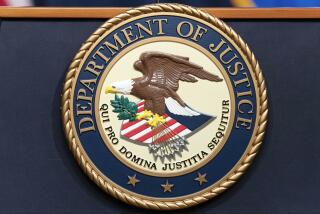Clinton Insists Balkan Terror Won’t Deter U.S.
- Share via
WASHINGTON — President Clinton vowed Thursday to continue on his present course of action on Bosnia-Herzegovina undeterred by terrorism, shrugging off a threat by a Bosnian Serb leader against the United States and a grenade attack on the U.S. Embassy in Belgrade.
“I don’t think the American people can afford to be afraid,” Clinton said.
Responding to a suggestion by Radovan Karadzic that the American aid airlift to Bosnia could produce terrorist attacks like the one on the World Trade Center in New York, Clinton said the Bosnian Serb leader “made a terrible mistake and it was something that I view with grave concern.”
Clinton’s remarks came on a day when the U.N. command in Sarajevo announced an agreement with Bosnian Serb military forces to permit U.N. military and relief officials to visit the Bosnian town of Cerska today to assess the situation and organize evacuation of the wounded.
According to still unconfirmed reports, Serbian militiamen massacred Muslim civilians in the isolated town earlier this week.
The President’s response to Karadzic was made after the Serbian leader, in an open letter to the American public, said the “tragic and deplorable terrorist incident at the World Trade Center is fresh testimony to the extraordinary volatility and immediate dangers of direct foreign involvement.”
Karadzic later disavowed the attempt to link American Balkan policy to the blast, a connection that already had begun to ring hollow because of the arrest of a suspect with Middle Eastern ties in connection with the New York explosion.
Karadzic told reporters at the United Nations that his letter was badly translated. But he did not make clear what he was trying to imply when he cited the bombing.
“I thought it might be an accident,” he said. “I didn’t think international terrorists would attack the United States. . . . Please neglect this sentence in the letter.”
But Karadzic let stand a warning that Clinton’s policy is “unwittingly exposing the American people and mankind to the hell of Armageddon.”
Karadzic was at the United Nations for three-way peace talks mediated by former U.S. Secretary of State Cyrus R. Vance and former British Foreign Secretary Lord Owen.
Word spread through U.N. corridors late Thursday that the talks had collapsed because Karadzic and Bosnian President Alija Izetbegovic had refused to offer any further concessions. But that rumor was soon squelched by Vance, who told reporters: “Contrary to the rumors, the talks have not collapsed. We talked at length. We will be meeting again tomorrow, and the talks will continue. . . . I’m hopeful.”
In Belgrade on Wednesday night, a hand grenade was thrown at the U.S. Embassy. State Department spokesman Richard Boucher said the attack caused no injuries and little property damage. Still, U.S. officials said it was a matter of concern because it amounted to a direct terrorist attack on an American installation.
Secretary of State Warren Christopher said the attack would not affect American policy. “Around the world we will not be deterred from doing what’s necessary for the United States by terrorist attacks of any kind,” he said.
Boucher, amplifying Christopher’s remarks, said: “The United States government has an excellent record of being able to track and prevent acts of terrorism, and when they occur, to be able to find those who are responsible.”
In Sarajevo, U.N. spokesman Barry Frewer said that the Bosnian Serb army chief, Gen. Ratko Mladic, “agreed in principle to open a corridor to Cerska,” although the Serbian objective seemed to be to empty the region of Muslims.
Gen. Philippe Morillon, head of the U.N. Protection Force, had demanded immediate U.N. access to the region and creation of a 24-hour corridor for civilians from Zepa, Cerska and Srebrenica to move freely and without fear of attack.
Bosnian Serb army chiefs said that Muslims fleeing the territory would be allowed safe passage but under the supervision of Serbian forces instead of the U.N. units, the Belgrade news agency Tanjug reported. The Serbs said the offer was made for humanitarian reasons, but diplomats said it appeared to be an attempt to speed the “ethnic cleansing”--the ejection of non-Serbs by Serbs--of the region.
But it was unclear where the refugees would find sanctuary nearby. Serbian forces control all but a handful of Bosnian government strongholds in eastern Bosnia, which was mostly Muslim before the war. The remaining pockets of resistance are under immediate threat.
Amateur radio operators in Konjevic Polje, part of the Cerska enclave overrun by Serbian forces, reported that 11 people were killed overnight in the town. The broadcasts reported a growing panic.
At the United Nations, Secretary General Boutros Boutros-Ghali called in Karadzic to rebuke him for his letter threatening terrorist attacks.
Karadzic opened his news conference by withdrawing the reference to the World Trade Center, but he then launched into a truculent defense of Serbian actions in the Bosnian war, blaming the Bosnian Muslims for igniting the flare-up of warfare in eastern Bosnia.
Times staff writer Kempster reported from Washington and Times special correspondent Silber from Belgrade. Staff writer Stanley Meisler at the United Nations contributed to this report.
More to Read
Get the L.A. Times Politics newsletter
Deeply reported insights into legislation, politics and policy from Sacramento, Washington and beyond. In your inbox twice per week.
You may occasionally receive promotional content from the Los Angeles Times.










